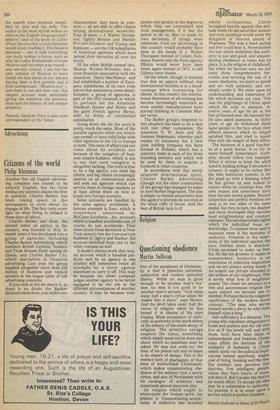The Good Life
Bed taste
Pamela Vandyke Price
Other people's dilemmas distract so soothingly from our less pleasing trivia. Remember the Angela Thirkell heroine who, after a domestically pounded day, took up , The Omnibus Book of Blood, Death, Murder and Disease as a more effective lullaby than any sedative? So I was much tempted by the book review that praised a story of "a
young war widow . torn between the demands of a neurotic, idealistic youth and a secret agent always off on one dangerous mission or another." To start with, the heroine sounds what, in the lower fourth, we should have called a 'soppy date' if she was torn between two such totally different people, unless of course she got some masochistic kick out of satisfying their doubtless unsatisfiable demands, dreary creUtures that they sound.
Translated into gastronomic terms, however, this dilemma is fascinating and fruitful. The secret agent would have lots of money ("Eat, drink, for tomorrow we are brainwashed"), but hardly ever be on hand; he would whisk the heroine briefly to hushed, discreet temples culinaires in which the plans of the fort would be in the olde parchemente cover of the wine list and rival spies would drop dead at the cyanide in the La Riche 1923, unnoticed amid the other customers merely having heart attacks at seeing the bill. When in residence, the secret agent would stock the heroine's cupboard with quickly whipped-up little snack foods, brought back from missions, such as caviare, wild rice, white truffles and whole crystallised bitter oranges. He would, of course, have an ulcer and be unable to partake, as all he would want would be you-know-who's tomato soup laced with Benger's Food or a long-cooking rice pudding. Demands satisfied all round.
Meanwhile, the neurotic idealist would not only be able to batten on all the delicacies, but would have the sort of metabolism that never gets indigestion even on six meals a day, so that the heroine could not only experiment copiously but get him to devour her bonnes bouches and amuses gueules even wherr they went a bit askew — he would be far cheaper than a waste disposal unit or tipping the dustman, as only a high protein diet keeps an idealistic neurosis really in fighting order. More satisfaction. And both would adore the heroine, no matter how plump she became. A positively edible design for living.
Still, gastronomic books are not for reading in bed. They cause one to get up and rummage in the kitchen. (Unless they are so idiotic that one dashes them to the floor. with an aggrieved thump that' wakes up the household). Wine books, however, do not, at such a time, make me arise brandishing a' corkscrew; rather — if they are good — do I start resolving to be good too, so that 1 may, in some celestial château, be able to order up another 1870 if the first bottle disappoints, and where one can taste preand post-phylloxera wines where there is never a fellow guest who asks if it isn't odd for a woman to care about wine, and the aftermath of all heaven-inspired drinks is wholly agreeable. Such are the soothing, though not necessarily soporific effects of a good bottle and a good book on wine — and such is the latest in the series of Christie's monographs on wine: Mouton-Rothschild, by Cyril Ray (£2.25 from Christie's Wine Department). It gives an account of the estate, the wine, the owner Baron Philippe de Rothschild, and
the superb wine museum assembled by him and his wife. The author is the most stylish writer on wine in the English language and I believe I said of his book on Lafite (Peter Davies) that a total abstainer would enjoy reading it. This book is personal – one is told everything one really wishes to know, such as why the Lafite Rothschilds criticise Mouton and the other way round – and adroitly critical; I am not the only admirer of Mouton to have found the fuss about its not always having been a first growth just a little unimportant. "Mouton suis" – and there it can and does rest, this elegant account most admirably giving the statistics, the personalities and the history of this unique property.
Pamela Vandyke Price is also wine correspondent of the Times



































 Previous page
Previous page